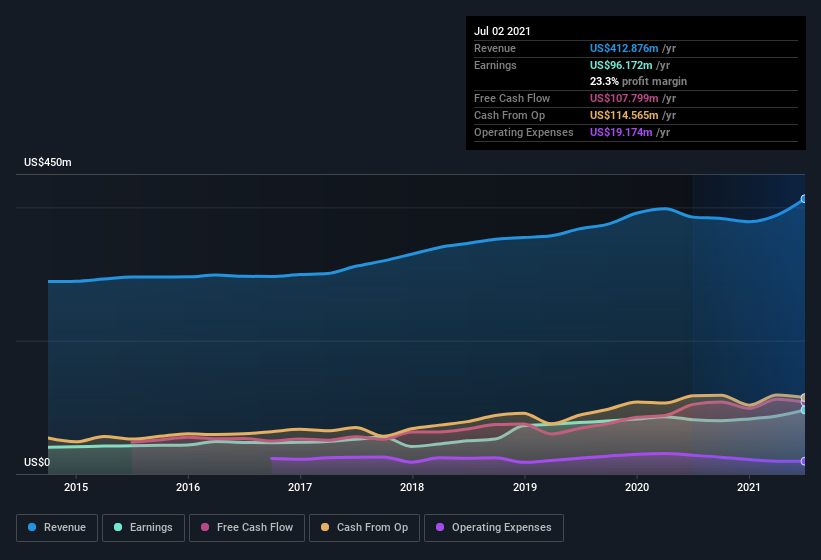If You Like EPS Growth Then Check Out Exponent (NASDAQ:EXPO) Before It's Too Late
Some have more dollars than sense, they say, so even companies that have no revenue, no profit, and a record of falling short, can easily find investors. And in their study titled Who Falls Prey to the Wolf of Wall Street?' Leuz et. al. found that it is 'quite common' for investors to lose money by buying into 'pump and dump' schemes.
So if you're like me, you might be more interested in profitable, growing companies, like Exponent (NASDAQ:EXPO). Even if the shares are fully valued today, most capitalists would recognize its profits as the demonstration of steady value generation. Conversely, a loss-making company is yet to prove itself with profit, and eventually the sweet milk of external capital may run sour.
Check out our latest analysis for Exponent
Exponent's Earnings Per Share Are Growing.
If a company can keep growing earnings per share (EPS) long enough, its share price will eventually follow. It's no surprise, then, that I like to invest in companies with EPS growth. As a tree reaches steadily for the sky, Exponent's EPS has grown 25% each year, compound, over three years. This has no doubt fuelled the optimism that sees the stock trading on a high multiple of earnings.
I like to take a look at earnings before interest and (EBIT) tax margins, as well as revenue growth, to get another take on the quality of the company's growth. While we note Exponent's EBIT margins were flat over the last year, revenue grew by a solid 7.1% to US$413m. That's progress.
In the chart below, you can see how the company has grown earnings, and revenue, over time. Click on the chart to see the exact numbers.
Of course the knack is to find stocks that have their best days in the future, not in the past. You could base your opinion on past performance, of course, but you may also want to check this interactive graph of professional analyst EPS forecasts for Exponent.
Are Exponent Insiders Aligned With All Shareholders?
Since Exponent has a market capitalization of US$6.0b, we wouldn't expect insiders to hold a large percentage of shares. But we are reassured by the fact they have invested in the company. Given insiders own a small fortune of shares, currently valued at US$75m, they have plenty of motivation to push the business to succeed. This should keep them focused on creating long term value for shareholders.
It's good to see that insiders are invested in the company, but are remuneration levels reasonable? A brief analysis of the CEO compensation suggests they are. I discovered that the median total compensation for the CEOs of companies like Exponent with market caps between US$4.0b and US$12b is about US$6.5m.
The Exponent CEO received total compensation of just US$2.7m in the year to . That looks like modest pay to me, and may hint at a certain respect for the interests of shareholders. CEO remuneration levels are not the most important metric for investors, but when the pay is modest, that does support enhanced alignment between the CEO and the ordinary shareholders. It can also be a sign of good governance, more generally.
Should You Add Exponent To Your Watchlist?
You can't deny that Exponent has grown its earnings per share at a very impressive rate. That's attractive. If you need more convincing beyond that EPS growth rate, don't forget about the reasonable remuneration and the high insider ownership. Each to their own, but I think all this makes Exponent look rather interesting indeed. We should say that we've discovered 1 warning sign for Exponent that you should be aware of before investing here.
Of course, you can do well (sometimes) buying stocks that are not growing earnings and do not have insiders buying shares. But as a growth investor I always like to check out companies that do have those features. You can access a free list of them here.
Please note the insider transactions discussed in this article refer to reportable transactions in the relevant jurisdiction.
This article by Simply Wall St is general in nature. We provide commentary based on historical data and analyst forecasts only using an unbiased methodology and our articles are not intended to be financial advice. It does not constitute a recommendation to buy or sell any stock, and does not take account of your objectives, or your financial situation. We aim to bring you long-term focused analysis driven by fundamental data. Note that our analysis may not factor in the latest price-sensitive company announcements or qualitative material. Simply Wall St has no position in any stocks mentioned.
Have feedback on this article? Concerned about the content? Get in touch with us directly. Alternatively, email editorial-team (at) simplywallst.com.

 Yahoo Movies
Yahoo Movies 

